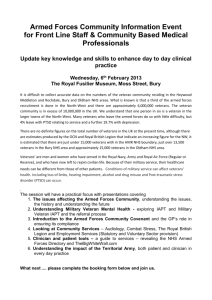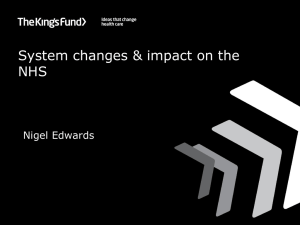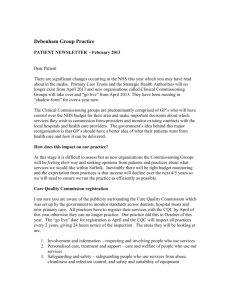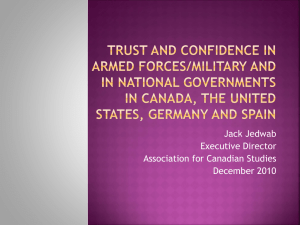The care pathway and presenting health needs Armed forces charities
advertisement
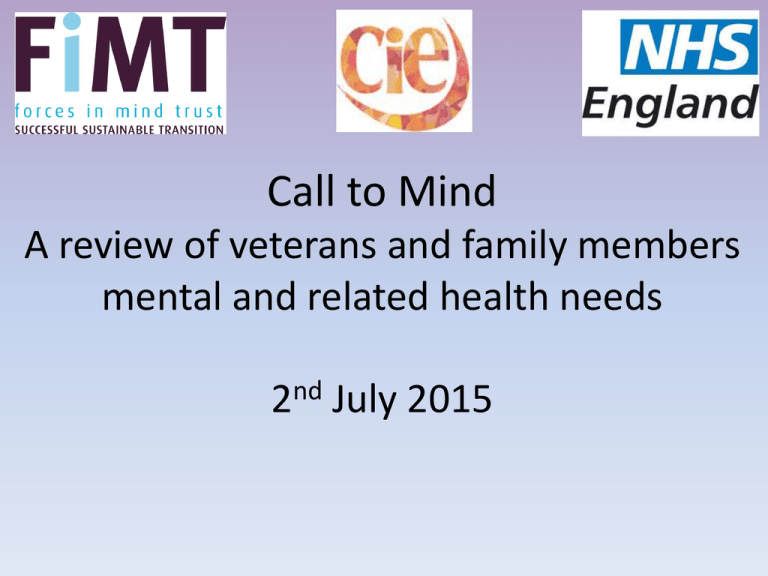
Call to Mind A review of veterans and family members mental and related health needs 2nd July 2015 Timing Activity Speakers 10.00 Introduction to the day Brian Parry BPA 10:05 Welcome from Chair Ray Lock FiMT 10:15 Opening remarks Lord Patel of Bradford 10:25 Commissioning and NHS England context Kate Davies Amanda Fisk 10:40 Summary of the HNA report Jon Bashford CIE LLP 11:00 Plenary discussion/Q&A 11:15 Coffee 11:30 to 12:30 Break-out groups 12:35 Plenary review Ray Lock 13:10 Next steps Senior NHS England rep 13:15 Closing remarks Ray Lock 13:16 Lunch 14:00 Close } NHS } England Meeting objectives • Early presentation of report findings for selected stakeholders and service users • To discuss emerging priority areas and consider how we can take these forward to bring real change • Opportunity to meet others working in the area of Veterans mental and related health Who is here today? • • • • • • • NHS Commissioners and Providers Local Authorities Other Government departments (MOD) Service charities Non-Service charities Academic researchers Service users Call to Mind A review of veterans and family members mental and related health needs Chair, Ray Lock Chief Executive Forces in Mind Trust ‘The aim of Forces in Mind Trust is to provide an evidence base that will influence and underpin policy making and service delivery in order to enable ex-Service personnel and their families to lead successful civilian lives’ Call to Mind A review of veterans and family members mental and related health needs Lord Patel of Bradford Director, CIE The Commissioning Architecture Kate Davies Head of Public Health, Armed Forces and their Families and Health & Justice & Amanda Fisk Director of Commissioning Health and Justice (South) and Armed Forces (England) NHS England www.england.nhs.uk 9 • NHS England welcomes review and the partnership approach and work with Forces in Mind and Community Innovation Enterprise (CIE) • NHS England will support the collaborative and partnership approach to improve : • commissioning for armed forces and their families • the transition and needs of veterans and their families www.england.nhs.uk 10 Armed Forces and their Families Commissioning Context • ‘Armed Forces Covenant’, the Mandate / NHS Constitution • 135,000 persons £43 million direct commissioning budget for the registered with Ministry of Defence (MoD) GPs (including mobilised reservists and some families). One team responsible for direct commissioning for this population – mainly Male, young and army other ranks • 2.5 million Veterans in England Transition from serving to veteran is key to good health - Clinical Commissioning Group (CCG) is lead commissioner - Mainly old - Clinical Needs different from general population • 2 Times the reported issues of Musculoskeletal (MSK) • 3 times the hearing loss Scope of armed forces services www.england.nhs.uk Organisation of armed forces in NHS England Overview of armed forces services provision Looking to the future 11 What We Commission • • NHS England is responsible for planning and commissioning for: - serving personnel - mobilised reservists - families registered with MoD medical centres Ministry of Defence commission: for serving personnel - Operational care - Occupational health - Primary care - Rehabilitation - Mental health services • Commissioning of services for other members of the armed forces community (i.e. most families, non-mobilised reservists and veterans) is the responsibility of CCGs • NHS England manages transition between MoD and NHS led care • Additional Funding is possible e.g. mental health services, prosthetics, wheelchairs and hearing aids (the last two will be funded by Royal British Legion). Scope of armed forces Organisation of www.england.nhs.uk services armed forces in NHS England Overview of armed forces services provision Looking to the future 12 Putting Patients First: Objectives 1 2 Services for the armed forces are commissioned to achieve the best health outcomes, in line with the commitments of the Armed Forces Covenant 3 4 We will work with the MoD and CCGs to improve the model of integrated care that service leavers with mental health or complex physical health needs receive Scope of armed forces Organisation of www.england.nhs.uk services armed forces in NHS England We work in partnership with the MoD to commissioning healthcare in line with the partnership agreement and in support of DMS’s objective to promote, protect and restore the health of the defence population in order to maximise fitness for role. We will collaborate with CCGs and Health and Wellbeing Boards to develop and embed strong armed forces networks to ensure that the armed forces community receives appropriate care regardless of commissioner Overview of armed forces services provision Looking to the future 13 Commissioning Responsibilities Complex set of commissioning responsibilities with Clinical Commissioning Groups and Defence Medical Services Serving Armed Forces in England Serving Armed Forces overseas Armed Forces Families registered with DMS in England Armed Forces Families registered with DMS overseas Armed Forces Families registered with NHS GP Reservists while mobilised Veterans Primary Care DMS DMS DMS DMS NHS England DMS and NHS England NHS England Community Mental Health DMS DMS NHS England DMS CCGs DMS CCGs Secondary Acute Community Care NHS England DMS and NHS England NHS England DMS and NHS England CCGs DMS and NHS England CCGs Scope of armed forces Organisation of www.england.nhs.uk services armed forces in NHS England Overview of armed forces services provision Looking to the future 14 Commissioning Armed Forces Services • The National Team sets the requirements • Service specification, policies and annual commissioning intentions. • Creates a climate for success, through effective relationships with national partners. • Supports regional team. • Undertakes selected national service reviews. • The Region • Accountable for the budget • Operational management of armed forces commissioning, • Working in 1 national team in 3 locations. • Develop collaborative commissioning with Partners: CCGs, Local Authorities, Public Health England and across MoD • Promote improved health outcomes and health & wellbeing. Scopewww.england.nhs.uk of armed forces Organisation of services armed forces in NHS England Overview of armed forces services provision Looking to the future 15 Armed Forces Clinical Reference Group • AFCRG has been established to cover services that are directly commissioned by NHS England and advise on other issues • Leads in developing the products required for the effective commissioning of armed forces services, including research • Aim to ensure clinical and patient led development and in particular the commissioning policies for serving personnel • They will have 5 areas of focus: • Pathway redesign • Musculoskeletal care • Mental health • Stakeholder engagement ( 3rd Sector and armed forces charities) • Improving Information sharing and making use of the digital revolution • Dr Jonathan Leach chairs the AFCRG with oversight from Professor Keith Willet in the Medical Directorate. Scopewww.england.nhs.uk of armed forces Organisation of services armed forces in NHS England Overview of armed forces services provision Looking to the future 16 Armed Forces South Region Leads with locality support Scopewww.england.nhs.uk of armed forces Organisation of services armed forces in NHS England Overview of armed forces services provision Looking to the future 17 Comparative Figures for Veteran Distribution Greater London South East South West East of England East Midlands West Midlands Yorkshire & Humber North East North West www.england.nhs.uk England population Royal British Armed Forces Legion Household Compensation 2014 Adult ex(AFCS and GP Service community WP) Registration % % % % 16% 17% 10% 11% 8% 11% 4% 15% 15% 12% 10% 11% 4% 19% 19% 9% 9% 8% 4% 19% 19% 8% 12% 9% 10% 5% 13% 14% 7% 12% 10% 8% 14% 10% 7% 12% Mental Health Taskforce: A Five Year Strategy for Mental Health Purpose and Approach: • Asked by Simon Stevens to address:• - Health and wellbeing gap • - Care and quality gap • - Finance and efficiency gap • Bringing together lived experience, professionals and system • Co-production of approach • Not reinventing the wheel – plenty of evidence • Under Mental Health Parity of Esteem www.england.nhs.uk 19 What people are telling us • Prevention is a priority • Access is a priority • Integrated support is a priority • Attitudes & experience is a priority www.england.nhs.uk 20 Access is a priority People want to quickly access effective care and treatment, when they need it Several aspects of access are coming through, including: • A focus on effective, high-quality treatment and greater choice of treatment; • A wide range of talking therapies, including for complex needs and access within community/primary care; • Reduced variation across the country; • Reduced waiting times; and • Reduced inequalities www.england.nhs.uk 21 Putting patients first: key deliverables • Deliver the Armed Forces Covenant and the best health outcomes, • Work closely and collaboratively with Clinical Commissioning Groups to ensure that services, are locally integrated improve care that the wounded, injured or sick service leavers (especially those with mental health or complex physical health needs) receive • Work in partnership with the Ministry of Defence to commission healthcare in line with a partnership agreement and in support of Defence Medical Services objectives to maximise fitness for role • Develop new commissioning policies with strong patient and public involvement • Develop common service specification for the improvement of mental health services in line with national policies • Revise our operational plans • Improve data collection Scope of armed forces Organisation of www.england.nhs.uk services armed forces in NHS England Overview of armed forces services provision Looking to the future 22 Next Steps • To improve local commissioning and the findings of this report to influence innovation and development across England. • To ensure NHS England's 5 year forward view continues to support the Armed Forces Covenant through mainstream commissioning and provision. www.england.nhs.uk 23 Call to mind: A framework for action Findings from the review of veterans and family members mental and related health needs assessments Dr Jon Bashford jon@ciellp.com Project aims • Review of the extent to which the mental and related health needs of veterans and family members are being assessed. • Identify priority areas for action to ensure that local services are commissioned appropriately and delivered effectively. Methods 1. Desktop review - all Joint Strategic Needs Assessments (JSNAs) across England: – 150 JSNAs 2. Focused consultation - involving 71 individuals: – 23 individuals from statutory health services e.g. veterans’ mental health services, CCGs, NHS Trusts and Universities; – 20 individuals from the armed forces charities; – 28 veterans and family members. 3. Analysis – key themes and priorities for action Outcome A proposed framework for action: Three building blocks: 1. Targeted and intelligent use of data and information 2. Appropriate and sensitive evidence based services 3. Involvement and participation of veterans and family members Targeted and intelligent use of data and information • The purpose of JSNAs is to provide analysis of the health needs of populations in order to inform and guide commissioning of health, wellbeing and social care services within local authority areas. • The need for JSNAs to adequately include and address the health and social care needs of veterans is supported by the commitments on health in the Armed Forces Covenant and the Health and Social Care Act 2012. Targeted and intelligent use of data and information • Fewer than half (40%) of JSNAs across England include a reference to the health needs of veterans; • Variations in geographical coverage and content e.g. less than half of the above (18%) have more than word ‘veteran’; • Only a handful cover the full range of health needs including mental health needs. Coverage of veterans in JSNAs in England by region 35 30 No JSNAs No ref veterans 25 20 15 10 5 0 Eastern East Midlands West Midlands Yorks & Humber Data in main report - page 19 South East South West London North West North East Targeted and intelligent use of data and information • The significant gaps in coverage of veterans’ health needs in the JSNAs for England have implications for local area commissioning and whether veterans’ health needs will be adequately addressed in Health and Wellbeing Strategies. This may have an impact on local authorities meeting their statutory duties for public health in line with the Health and Social Care Act 2012. • It is also possible that if veterans and family members are not included in JSNAs then CCG commissioning plans may be affected if they are unable to more fully address this population’s health needs. Targeted and intelligent use of data and information Priority areas for change and improvement: • primary and secondary care data collection and analysis of veterans and family members; • training and awareness of GPs and wider primary care staff; • adopting a population based approach to health inequalities for veterans and family members. Comparative data - numbers and location of veterans 20 Eng Pop 18 RBL 2014 16 AFCS 14 GP Reg 12 10 8 6 4 2 0 Eastern East Midlands West Midlands Yorks & Humber South East South West London North West North East GP registration of veterans compared with population 20 Eng Pop GP Reg 18 16 14 12 10 8 6 4 2 0 Eastern East Midlands West Midlands Yorks & Humber Data in main report - page 24 South East South West London North West North East The care pathway and presenting health needs Prevention and early intervention “The GP couldn’t understand what I was trying to explain, my emotional state, physical health, I was also drinking too much, I was just given pills, no referral.” (Consultation respondent, veteran and family members) ”There are problems getting GPs to understand the issues and feel confident in this area…GPs have very little understanding about veterans...” (Consultation respondent, statutory service) The care pathway and presenting health needs Veterans themselves often: • feel reluctant to admit to perceived weakness or being in a position of having to ask for help; • have unrealistic expectations about waiting times and service responses and perceptions that civilians can’t or don’t understand military culture; • Lack awareness and understanding about the options for help and which services are provided either in the armed forces charities or statutory services in the NHS and local authorities. The care pathway and presenting health needs Access criteria: “Sometimes people are referred to services but they don't fit the access criteria for either a community mental health team or primary care, they may have personality issues, not coping, problems with adaptation.” (Consultation respondent, statutory service) “It’s trial and error to find a good thing.” (Consultation respondent, veteran and family members) The care pathway and presenting health needs Complex needs: “It’s never just a mental health issue, alcohol, debt, employment someone needs to be addressing these needs while the person has therapy for mental health problems.” (Consultation respondent, armed forces charity) “If there is any trauma the IAPT reject the case, if they are too angry or too drunk IAPT won’t see them, and they won’t own the referral it just goes back to GP or nowhere.” (Consultation respondent, statutory service) The care pathway and presenting health needs Alcohol and drugs “All the mental health programmes need to have an effective alcohol pathway built in.” (Consultation respondent, armed forces charity) “The big gap is in alcohol services, there needs to be a pathway for alcohol.” (Consultation respondent, statutory service) “Drug problems definitely exist, I’ve seen it clinically but it doesn’t feature in the research.” (Consultation respondent, statutory service) The care pathway and presenting health needs Families and children “The families don’t know where to get help, they are often isolated with the problems.” (Consultation respondent, armed forces charity) “Families go through a lot, they need to be involved more.” (Consultation respondent, veteran and family members) “CAMHS responses for children of veterans are poorly developed, there needs to be greater awareness about this area.” (Consultation respondent, statutory service) The care pathway and presenting health needs Social care needs “It works well when you don’t just look at mental health in isolation but include wrap around services, helping people with housing, social care, employment as well as mental health”. (Consultation respondent, statutory service) “The whole pathway is problematic, there shouldn’t be services in silos, we need more integration not just with mental health but broader welfare.” (Consultation respondent, statutory service) The care pathway and presenting health needs Physical and related needs “Once you say you have a mental health problem they won’t treat anything else.” (Consultation respondent, veteran and family members) “People don’t physically improve if their mental health doesn’t improve, the two are linked.” (Consultation respondent, statutory service) “A lot have both physical and mental health problems, but is hard to get this recognised or dealt with together,” (Consultation respondent, armed forces charity) The care pathway and presenting health needs Armed forces charities “A lot of the charities are only signposting but if this doesn’t result in people accessing and staying in treatment then it's a waste of money.” (Consultation respondent, armed forces charity) “There are too many charities, you don’t where which ones to go to.” (Consultation respondent, veteran and family members) “There needs to be a kite marking system for the charities but one with teeth…” (Consultation respondent, armed forces charity) The care pathway and presenting health needs Armed forces charities “The charities bring additional benefits for engagement with veterans, our branding brings credibility and mainstream services could benefit from this in creating improved access.” (Consultation respondent, armed forces charity) “Working with a good military charity gives credibility to the NHS service and helps the charity work better with us, it all helps the veterans engage better.” (Consultation respondent, statutory service) Appropriate and sensitive evidence based services • Prevention and early intervention involving the full range of primary and social care professionals; • less restrictive access criteria that can enable services to better respond to complex needs; • clear referral routes for alcohol services as part of an integrated care pathway; • recognition of the needs of family members including children and parents of veterans that takes account of the wider determinants of health such as access to employment, and adequate housing; • greater integration in service responses for meeting both physical and mental health needs and social care needs; • clarity on liaison and partnership working between statutory services and the armed forces charities. Appropriate and sensitive evidence based services A variety of factors are thought to influence the successful service models including: • a lead clinician with dedicated time and responsibilities for veterans; • champions within departmental service areas across Trusts – often though not exclusively these are clinicians and managers who are themselves veterans; • specific veteran and family member service user forums; • partnership agreements with local armed forces charities where these form part of an integrated pathway; • training and awareness programmes; • formal recognition of the service development with local commissioners either through contracting and procurement or CQUINs (Commissioning for Quality and Innovation). Involvement and participation of veterans and family members Effective involvement and participation of veterans and their family members is essential for improving data collection and the successful development of appropriate and sensitive evidence based services. There is a need to further strengthen the involvement of veterans and family members in local area service developments to ensure that there is a strong service user voice. Involvement and participation of veterans and family members • Raising awareness – when this is undertaken directly by veterans and family members in a supported way it can greatly enhance credibility and validity of the core messages; • Reducing stigma – overcoming this can be challenging and it is essential that veterans and family members are directly involved; • Assessing and articulating needs –their active involvement also helps ensure that changing needs are picked up at an earlier point and that potential service gaps are avoided; • Co-designing commissioning and service provision – appropriate and sensitive evidence based services are more likely to be developed with the full and active participation of veterans and family members. Conclusion The three building blocks are interdependent and will: • improve the assessment of needs; • inform commissioning; • enhance the delivery of appropriate and sensitive local services that are evidence based; • require collaboration and partnership working across the full range of stakeholders; • promote the involvement veterans and family members Break-out group discussions After coffee By 11.30 am please be at your discussion group Call to Mind A review of veterans and family members mental and related health needs Next steps/Closing remarks Amanda Fisk and Ray Lock Next steps/Closing remarks • Slides from today will be posted on our website later today http://www.fim-trust.org/reports/ • Feedback from today will be summarised and circulated in a short note to all participants • Send more thoughts on today to Jon@ciellp.com • Report might include annex with key ideas emerging from discussions • Report published by Forces in Mind Trust later this Summer • Come back next year and see how we’re doing? Call to Mind A review of veterans and family members mental and related health needs Thank you for your engagement and enjoy lunch!
